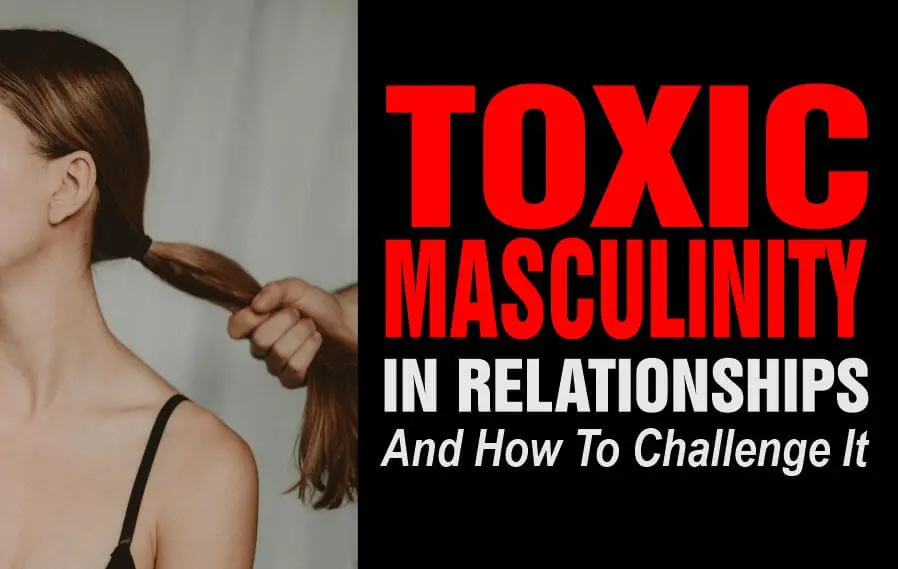Relationships give the perfect cover for harmful masculinity to thrive. Here are some of the ways to challenge toxic masculinity in relationships.
Toxic masculinity seeks vulnerable and easy targets to express itself, and these targets are abundant within the confines of relationships, both romantic and workplace.
These unhealthy behaviours can hinder effective communication, and emotional expression and contribute to imbalances within relationships.
There are steps a victim can take to overcome this challenge including creating healthy boundaries and inculcating emotional intelligence.
We have detailed these steps below to help you identify toxic masculinity in relationships and how to overcome it.
You might also like what it means to be a real man
Table of Contents
- Toxic Masculinity in Romantic Relationships
- Toxic Masculinity in Workplace Relationships
- The Impact of Toxic Masculinity on Relationships
- Benefits of Challenging Toxic Masculinity in Relationships
- Signs of Toxic Masculinity in Relationships
- How to Challenge Toxic Masculinity in Relationships
- Overcoming Challenges in Challenging Toxic Masculinity
- Frequently Asked Questions
- Conclusion
Toxic Masculinity in Romantic Relationships
Toxic behaviours in romantic relationships often include dominance, controlling behaviour, emotional suppression, and an emphasis on physical strength and power.
Toxic masculinity can lead to unhealthy power dynamics in relationships, with men exerting control over their partners and devaluing their emotions and needs.
It can also contribute to a culture of violence and aggression, both physical and emotional, when these expectations of masculinity are not met.
Here is a comprehensive article on masculinity.
Toxic Masculinity in Workplace Relationships

In a professional context, this can lead to a hostile work environment characterized by harassment, discrimination, and power imbalances.
Toxic expression of masculinity discourages open communication, stifles collaboration, and obstructs diversity and inclusion efforts.
It can also contribute to high levels of workplace stress and negatively impact the mental and emotional well-being of employees.
Challenging toxic masculinity in the workplace is essential for encouraging a more respectful, inclusive, and equitable environment that promotes healthier relationships among colleagues.
Related: The gentleman’s healthy masculinity
The Impact of Toxic Masculinity on Relationships
The impact of toxic masculinity on relationships can significantly affect individuals and their interactions with others, particularly in the following ways:
Negative Effects on Mental Health: Toxic masculinity negatively impacts men and the mental health of their partners. Conforming to rigid gender roles leads to inadequacy, anxiety, depression, emotional suppression, and relationship difficulties.
Barrier to Open Communication and Vulnerability: Toxic masculinity discourages emotional expression, seeking help, and vulnerability, hindering open communication in relationships and making it difficult to address conflicts and build trust.
Reinforcement of Gender Stereotypes: Toxic masculinity enforces gender stereotypes, restricting individuality and promoting inequality. It promotes rigid roles, dominance, and emotional suppression, leading to power imbalances and hindering equitable relationships and diverse perspectives.
Related: The Toxic Masculinity Test and How to Take it
Benefits of Challenging Toxic Masculinity in Relationships

Of course, there are many benefits of challenging and overcoming toxic masculinity both in romantic relationships and the workplace.
Let’s take a look…
- Challenging toxic masculinity in relationships promotes emotional expression and vulnerability, leading to a deeper connection and increased intimacy between couples.
- Challenging harmful masculinity improves communication and conflict resolution by replacing aggression and dominance with empathy and understanding in relationships.
- Challenging harmful ways to be a man in relationships has long-term effects by creating a healthier environment for future generations, breaking the cycle of harmful gender norms and promoting more equal and respectful relationships.
- Challenging unhealthy ways of expressing masculinity enhances a more inclusive and respectful workplace culture. This can lead to a more harmonious and supportive environment where employees feel valued and safe.
- Addressing toxic manliness helps reduce incidents of harassment and discrimination. When employees are educated about respectful behaviour and boundaries, they are less likely to engage in harmful behaviours.
- Expressing masculinity in a toxic way can hinder effective teamwork and collaboration. By promoting communication, empathy, and cooperation, challenging these norms can improve group dynamics and productivity.
- Employees who work in an environment that actively combats toxic masculinity are more likely to be satisfied with their workplace. Higher job satisfaction can lead to increased retention rates and better morale.
Related: Be Emotionally Intelligent, Be a Real Man
Signs of Toxic Masculinity in Relationships
In relationships, toxic masculinity can manifest in various ways, often leading to unhealthy dynamics and harm to both partners.
Here are some signs in relationships:
Emotional Suppression: Men are often socialized to suppress their emotions, which can lead to emotional detachment in relationships.
Domination and Control: Toxic ways of being a man can manifest as a desire for control and dominance in a relationship.
Aggression and Anger: Aggressive behaviour, including physical, verbal, or emotional aggression, can be a sign of toxic masculinity. Men who adhere to these norms may resort to anger and aggression as a way to assert their dominance.
Stoicism: Approaching masculinity with toxicity in relationships often promotes the idea that men should be stoic and unemotional.
Sexual Objectification: Objectifying a partner or viewing them primarily as a sexual object is another sign of toxicity.
Pressure to Conform to Gender Roles: Toxic masculinity enforces rigid gender roles, which can limit individuals’ freedom to be themselves.
Insecurity and Jealousy: Toxic expression of masculinity in relationships can lead to insecurity and jealousy, as men may feel threatened by any perceived challenge to their masculinity.
Related: Emasculation of Men: Signs and Examples
How to Challenge Toxic Masculinity in Relationships

Challenging harmful masculinity in relationships needs patience and understanding.
1. Educate Yourself
Start by understanding what toxic masculinity is and how it manifests in relationships.
Educate yourself about the harmful effects it can have on both men and women.
Read books, articles, watch documentaries, and engage in discussions to gain a better understanding of this issue.
2. Promote Equality and Mutual Respect
Promoting equality and mutual respect is an effective way to challenge toxic masculinity in relationships.
Creating a safe environment for open conversations on gender roles promotes equity and respect in relationships.
Sharing responsibilities and decision-making challenges harmful notions, promoting equality, and respect, and breaking free from toxic masculinity.
3. Reflect on Your Own Beliefs and Behaviours
Take the time to reflect on your own beliefs, values, and behaviours . Reflect on how these might have been influenced by societal expectations around masculinity.
Be open to recognizing any toxic masculinity traits that you may have internalized and consider how they may impact your relationships.
Related: Relationship Lessons for Under-30s Men
4. Practice Self-awareness and Emotional Intelligence
Develop your emotional intelligence by being aware of your own emotions, triggers, and behavioural patterns.
This will help you respond to challenging situations in healthier ways, breaking free from toxic masculine norms that promote aggression, anger, or emotional detachment in relationships.
5. Encourage Emotional Intelligence and Expression
Creating a supportive environment for emotional expression challenges toxic masculinity in relationships.
By listening, validating, and empathizing, partners break down barriers imposed by harmful stereotypes, promoting healthier masculinity and sustaining stronger emotional bonds.
Related: Signs of a High Value Man and How to Be One
6. Encourage Healthy Boundaries and Consent
Promoting healthy boundaries and consent challenges toxic masculinity in relationships.
Highlighting positive role models who prioritize open communication, empathy, and respect can shift societal norms towards healthier dynamics, promoting a culture of mutual respect and understanding.
7. Encourage positive Role Models and Challenge Societal Norms
Diverse representations of masculinity challenge toxic stereotypes, promoting authenticity with vulnerability and emotional intelligence.
Challenging traditional gender roles creates equity by encouraging caregiving roles and shared responsibilities, rejecting dominance expectations for a more inclusive society.
8. Challenge Traditional Gender Roles
Question and challenge traditional gender roles within your relationship.
Encourage open discussions about shared responsibilities, decision-making processes, and household or childcare tasks.
Ensure that you and your partner have equal opportunities to pursue personal interests, careers, and personal growth.
Related: How to Recognize Toxic Masculinity in the Workplace
Overcoming Challenges in Challenging Toxic Masculinity
Overcoming challenges in challenging toxic masculinity in relationships involves addressing resistance from societal norms and expectations.
Also, unlearning toxic behaviours and beliefs, and seeking professional help and support is advised.
Let’s take them one after the other:
1. Resistance to Societal Norms and Expectations
Challenging toxic masculinity in relationships can face resistance from societal norms and expectations that perpetuate harmful gender stereotypes.
Society often places pressure on men to conform to certain masculine ideals, which may include being dominant, emotionless, and aggressive.
These norms can make it challenging to challenge toxic behaviours and beliefs in relationships.
To overcome this challenge, it is important to raise awareness and educate others about the harmful effects of toxic masculinity.
Through open conversations, media representation, and advocacy, we can challenge societal expectations and encourage healthier, more egalitarian relationships based on respect, empathy, and communication.
2. Unlearning Toxic Behaviours and Beliefs
Challenging toxic masculinity in relationships also requires unlearning toxic behaviours and beliefs that have been ingrained through socialization.
These behaviours might include emotional suppression, aggression, controlling behaviour, or the objectification of women.
Overcoming this challenge involves introspection and self-reflection. Men need to critically examine their actions and beliefs, acknowledging and challenging toxic behaviour patterns.
This process might involve practicing vulnerability, empathy, and active listening, as well as seeking education and resources to better understand the impact of toxic masculinity on relationships.
It is essential to replace toxic behaviours with healthier alternatives that promote equality, understanding, and mutual respect.
3. Seeking Professional Help and Support
Another crucial aspect of overcoming challenges in challenging toxic masculinity in relationships is seeking professional help and support.
Toxic masculinity can be deeply ingrained and impact one’s mental health, communication skills, and self-image.
Professional therapists, counselors, or support groups can provide the necessary guidance and safe spaces to discuss and address these issues.
Professionals can help individuals in identifying harmful patterns, developing coping strategies, and encourage healthier relationships.
They can also guide how to navigate societal pressure and norms, and support individuals in their journey of personal growth and change.
Suggested: What is Fragile Masculinity?
Frequently Asked Questions
How can toxic masculinity be challenged?
Toxic masculinity can be challenged by promoting healthy ideas of masculinity, encouraging emotional expression, teaching consent, and addressing the harmful effects of rigid gender norms.
How do you deal with toxic masculinity in a relationship?
To deal with toxic masculinity in a relationship, open communication is crucial. Recognize harmful behaviours, create equality, encourage emotional support, and facilitate mutual respect to create a healthier dynamic.
How does toxic masculinity affect relationships?
It can negatively impact relationships by reinforcing power dynamics, limiting emotional intimacy, encouraging aggression, and suppressing individuality. These harmful traits can strain the connection and lead to unhappiness.
How do you recover from toxic masculinity?
Recovering from toxic masculinity involves unlearning harmful beliefs and behaviours. This can be achieved through education, therapy, self-reflection, embracing vulnerability, and striving for positive masculinity that respects equality and emotional well-being.
Conclusion
Toxic masculinity in relationships is a deep-rooted issue that negatively impacts both individuals and society as a whole.
The pressure to conform to rigid gender roles and engage in harmful behaviours not only limits emotional expression among men but also perpetuates unhealthy power dynamics within relationships.
To challenge toxic masculinity, individuals must engage in open and honest communication, challenge traditional norms, and actively create a safe and inclusive space for healthy relationships to thrive.
It is crucial to promote empathy, emotional intelligence, and equality in all aspects of life, thus dismantling toxic masculinity and paving the way for healthier, more fulfilling relationships.
References:
https://www.marriage.com/advice/mental-health/signs-of-toxic-masculinity-in-a-relationship/
Pyo Merez is a men’s lifestyle enthusiast and writer about the gentleman’s place and impact on society. Raised by a distinguished gentleman dad, he offers unique insights into how the mind of a gentleman works and how societal norms shape gentlemen’s identity and vice versa.
Through his insightful articles, Pyo taps into the depths of gentleman culture to provide perspectives on etiquette and manners in modern society.

